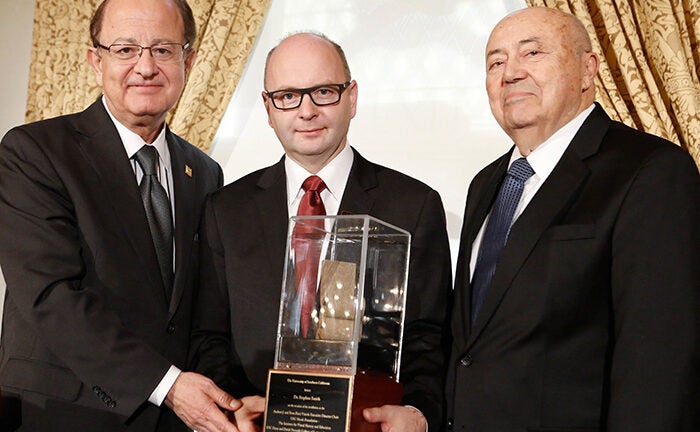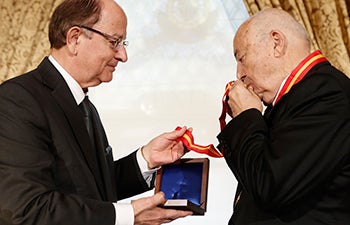
Viterbi Chair Installed
USC President C. L. Max Nikias praised Stephen Smith, executive director of USC Shoah Foundation — the Institute for Visual History and Education, for his dedication to preserving memory of the past through testimony. The remarks came as part of a Nov. 4 ceremony where Smith was installed as the inaugural holder of the Andrew J. and Erna Finci Viterbi USC Shoah Foundation Executive Director Chair.
The chair was established in 2014 through a $5 million gift to USC Shoah Foundation from the Viterbis.
Nikias said Smith is poised to lead USC Shoah Foundation into a future of achievement.
“We need only look to the Viterbis to understand this one simple truth: The past may always be present, but the future is ours to change,” Nikias said. “Stephen Smith is a champion of this vision. He has seen how eyewitness testimony can change the world, one voice at a time.”
From hardship to generous giving
Erna Finci Viterbi, a Sephardic Jew, was born in Sarajevo in what was then Yugoslavia. She and her family fled the country during World War II and were deported to the Parma region of Italy. Interned in the village of Gramignazzo di Sissa, they were saved from deportation to extermination camps by the townspeople and escaped to Switzerland for the remainder of the war. In 1950, they moved to California.

USC President C. L. Max Nikias presents Andrew Viterbi with two Presidential Medallions, USC’s highest honor — one for him and one for Erna.
In 1958, Erna married Andrew Viterbi, a communications theory and electrical engineering scholar whose family left Italy to escape the Nazis in 1939. He earned his Ph.D. at USC in 1962, helped invent several key components of modern digital communications technology and cofounded the tech companies Linkabit and Qualcomm.
Together, the Viterbis have devoted much of their lives to philanthropy, supporting many causes including education, the arts, Jewish organizations, and technology and science research. In 2004, the couple named the USC Andrew and Erna Viterbi School of Engineering with a $52 million gift.
Erna Viterbi, who served on USC Shoah Foundation’s Board of Councilors, died in 2015.
A global legacy
In his remarks, Smith spoke about the importance of remembering history and learning from it.
“My role as the inaugural chair is to rethink how we understand the hideous past of genocide through the digital humanities,” Smith said. “We fanatically preserve the interviews, and that is because we want to share them with all the people of the world. This willingness to confront the past and the future together — no other institute can do that the way USC Shoah Foundation does — faces the challenge of catastrophic human behavior and its dire consequences as a pathway to avoid their recurrence.”
USC Dornsife Dean Steve Kay said the university’s commitment to understanding the most daunting problems of the world would not be possible without supporters like the Viterbis.
“For those of us who have interacted with Andrew and Erna over the years, we’ve all seen this incredible commitment to USC, to the Shoah Foundation and to our mission to make the world a much better place,” Kay said. “Without that kind of support and commitment from people like this, we can’t move our mission forward.”
In remembrance and for the future
Andrew Viterbi also spoke briefly about his late wife’s dedication and passion for USC Shoah Foundation. After her family’s experiences during the Holocaust, and subsequent genocides like the Rwandan Tutsi Genocide, she made it her mission to do everything she could to prevent such evils from occurring again, he said.
He also explained that she had specifically requested that her maiden name, Finci, be part of the title of the USC Shoah Foundation Executive Director Chair because she wanted to honor her family and its history, of which she was very proud.
The installation ceremony concluded with Los Angeles City Councilmember Paul Koretz presenting certificates of appreciation from the city of Los Angeles to Smith and Viterbi for their contributions to society. Nikias then presented Viterbi with two Presidential Medallions, USC’s highest honor — one for him and one for Erna.